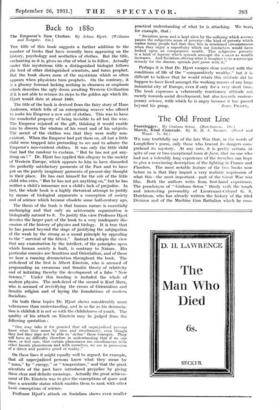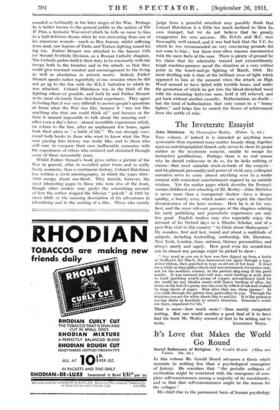The Old Front Line
Footslogger. By Graham Seton. (Hutchinson. 18s.) WE may truthfully say of the late War that, in the words of Longfellow's poem, only those who braved its dangers com- prehend its mystery. At any rate, it is pretty certain, in spite of one or two exceptional tours de force, that no one who had not a tolerably long experience of the trenches can hope to give a convincing description of the fighting in France and Flanders. The most notable feature of the two books now before us is that they impart a very realistic impression of what this—the most important—part of the Great War was like. Both the authors write from first-hand experience. The pseudonym of " Graham Seton " thinly veils the tough and interesting personality of Lieutenant-Colonel G. S. Hutchison, who has already written the history of the 83rd Division and of the Machine Gun Battalion which he coin- manded so brilliantly in the later stages of the War. Perhaps 'he is better known to the general public as the author of The W Plan, a fantastic War-novel which he tells us came to him in a half-delirious dream when he was recovering from one of his numerous wounds—much as Ben Jonson, whilst suffering from gout, saw legions of Turks and Tartars fighting round his big toe. Father Steuart was attached to the famous 15th (or Second Scottish) Division, as a Roman Catholic chaplain. The Catholic padres held it their duty to be constantly with the troops both in the trenches and in the attack, so that they could give constant comfort and encouragement to the living as well as absolution in articulo mortis. Indeed, Father Steuart speaks rather regretfully of one occasion when he did not go up to the line with the H.L.I. battalion to which he was attached. Colonel Hutchison was in the thick of the fighting whenever possible, and both he and Father Steuart write most obviously from first-hand experience. They agree in feeling that it was very difficult to answer people's questions at home what the War was like, because it " was not like anything else that one could think of," and because at the time it seemed impossible to talk about the amazing and— after even a day's leave—almost incredible experiences which, on return to the line, after an unpleasant few hours, again took their place as " a habit of life." We can strongly com- .mend both books to those who want to know what the War now passing into history was really like, and to those who still care to compare their own ineffficeable memories with the experiences of others who endured and abstained through some of those memorable years.
Whilst Father Steuart's book gives rather a picture of the War in general, alike in so-called quiet times and in really _lively moments, than a continuous history, Colonel Hutchison has written a vivid autobiography, in which the years 1914- 1918 occupy about one-third. They furnish, however, the Most interesting pages to those who were also at the front, 'though other readers may prefer the astonishing- account 'of how the author stopped the Silesian ".putsch " in 1921 by -sheer bluff, or the amusing description of his adventures in advertising and in the making of a film. Those who merely
judge from a' peaceful armchair may possibly think that Colonel Hutchison is a little too much inclined to blow his own trumpet, but we do not believe that he greatly exaggerates his own services. His D.S.O. and M.C. were thoroughly well earned, and it was bad luck that the V.C. for which he was recommended on very convincing grounds did not come to him ; but there were often reasons unconnected with the mere facts of the case. There is plenty of ground for 'his claim that his admirably trained and extraordinarily tough machine-gunners saved the situation at a very critical point in the touch-and-go fighting of March, 1918. His most thrilling tale is that of the brilliant cross of light which appeared to him at the moment when the attack on High Wood seemed to have failed with terrible losses, and under the protection of which he got into the blood-drenched wood with his remaining forty-one men, held it till relieved, and got back without another casualty. Hallucination, no doubt— but the kind of hallucination that only comes to a " bonny fighter," and helps him to snatch the flower of achievement from the nettle of ruin.



































 Previous page
Previous page